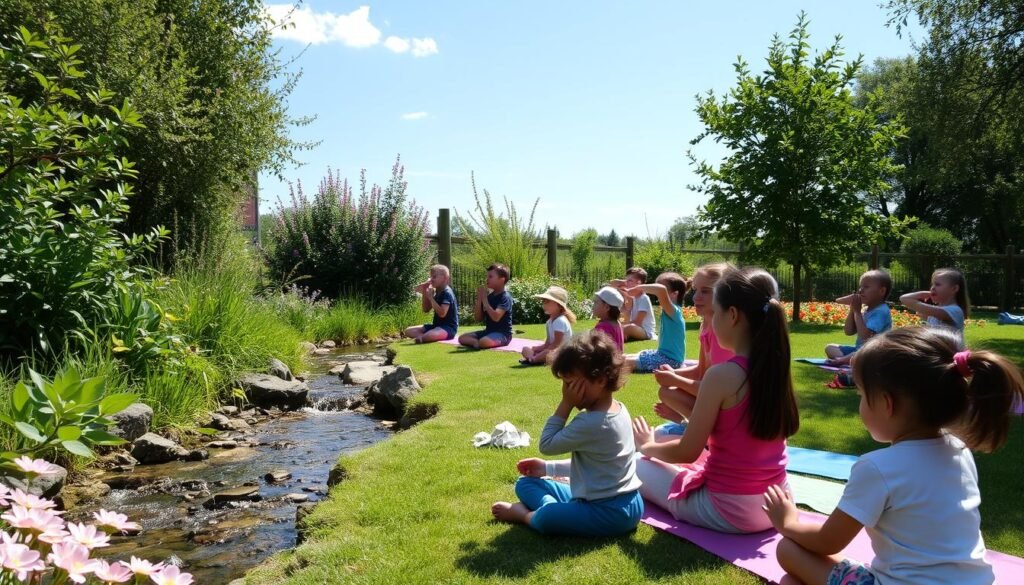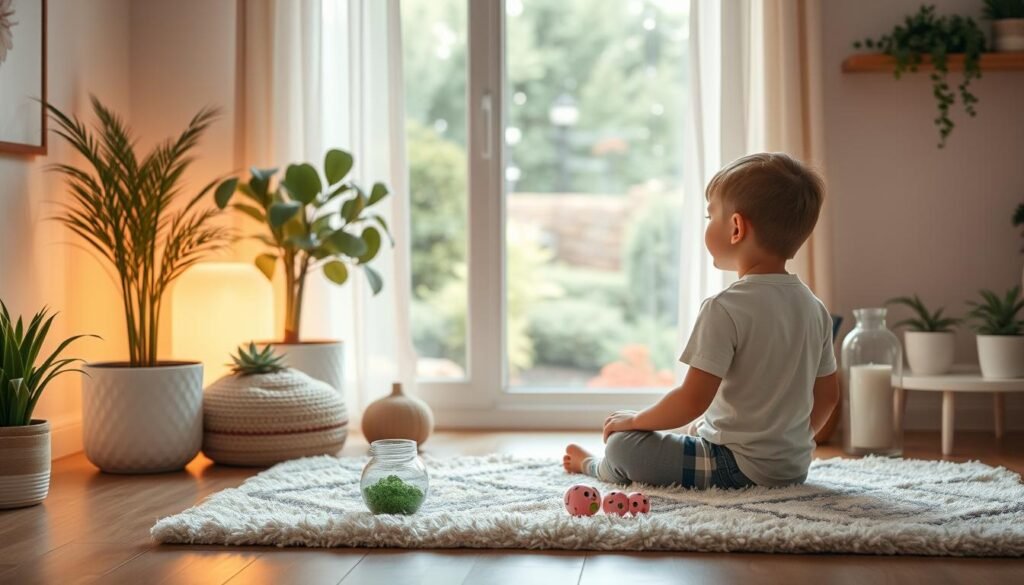Did you know that 80% of kids feel better emotionally when they learn coping strategies? Things like deep breathing and mindfulness really help. Since anxiety is growing among kids, parents are searching for natural anxiety relief for kids. It’s vital to find safe solutions for peace. These methods help kids handle their emotions without medication.
Anxiety affects how kids socialize and do in school. Studies show that kids do 75% better at managing anxiety when they talk openly with parents. This shows how key it is to build environments that look after emotional health.
This article shares various ways to support kids’ emotional strength. These include exercise, mindfulness, and natural remedies. Such techniques reduce anxiety symptoms and give kids skills for life. For herbal solutions and tips to lower anxiety, check this detailed guide.
Key Takeaways
- 80% of children show improved emotional well-being with coping strategies like mindfulness.
- 75% improvement in anxiety management is linked to open communication with parents.
- Consistent routines contribute to a 65% reduction in children’s anxiety levels.
- Storytelling therapy can lead to a 90% improvement in emotional resilience.
- Incorporating physical activities is essential for emotional health.
Understanding Childhood Anxiety
Many children suffer from anxiety, caused by different reasons of anxiety in children. Spotting these causes is key in finding good ways to ease their anxiety.
What Causes Anxiety in Children?
Several things, like environment and feelings, cause anxiety in kids. Family issues, bullying, big changes, or school stress can make them anxious. When parents try to protect them from fears, it might make anxiety worse. Plus, staying away from things that scare them doesn’t help them cope for good.
Helping kids avoid scary situations might actually make their fears stronger. They don’t learn to face what’s bothering them.
- Parents’ protective behavior can make childhood anxiety worse.
- It’s important to support their feelings without making them bigger.
- Talking openly about emotions helps with managing anxiety.
- If anxiety is really bad, getting help from doctors or mental health experts is key.
The Impact of Anxiety on Daily Life
Anxiety can greatly affect a child’s life, touching how they grow and interact with others. An anxious child might be irritable, too clingy, or have trouble sleeping. These issues can mess with school work and friendships, making them pull away from others and skip daily activities.
| Symptom | Potential Impact |
|---|---|
| Irritability | Strained relationships with family and peers |
| Difficulty Sleeping | Reduced concentration in school |
| Clinginess | Limitations in social activities |
| Negative Thoughts | Poor self-esteem and confidence issues |
It’s critical to tackle these issues early. This helps children grow stronger and learn ways to handle their anxiety better as they grow.
Natural Anxiety Relief for Kids: Effective Strategies
Anxiety impacts many kids, with up to one in five facing these concerns. Natural methods can greatly boost their happiness and growth. By learning about different anxiety management methods, kids and parents can find effective ways to handle anxiety in their daily lives.
Engaging in Physical Activities
Being active is key for easing kids’ anxiety naturally. Exercise boosts endorphins, lifting spirits and cutting down on worry. Through sports or playing outside, kids can forget stressors. They also learn teamwork and make friends, which are vital for feeling emotionally stable.
Creating an Anti-Anxiety Toolkit
An anti-anxiety toolkit gives kids quick help when they’re worried. Things like fidget toys and art supplies can calm them. Access to these tools teaches kids how to calm down on their own, making them more self-reliant when anxious.
Using Deep Breathing Techniques
Deep breathing is a simple, powerful way to reduce anxiety. The “4-7-8” method can calm a child’s mind, letting them control stress better. Making this a regular habit can strengthen their ability to relax during tense moments.

| Strategy | Description | Benefits |
|---|---|---|
| Physical Activities | Engaging in structured sports and outdoor play. | Releases endorphins, lifts mood, fosters social skills. |
| Anti-Anxiety Toolkit | Utilizing tools like fidget toys and art supplies. | Immediate support for managing anxiety, encourages independence. |
| Deep Breathing Techniques | Practicing techniques like “4-7-8” breathing. | Calms the nervous system, helps regulate stress response. |
Mindfulness Exercises for Anxious Children
Around 5.8 million kids in the U.S. struggle with anxiety. Using mindfulness can help these children cope better. By adding mindfulness exercises to everyday routines, kids can improve their emotional health. Here are some effective ways to teach children mindfulness and meditation.
Introducing Mindfulness and Meditation
Meditation for kids teaches them how to stay present and ease their worries. They learn to pay attention to their feelings and what’s around them, which lessens stress about past or future events. Keeping these activities enjoyable will keep them interested. Sites like Mindfulness for Kids provide fun ideas for getting started.
Simple Yoga Practices
Yoga helps kids become more flexible and emotionally strong. By trying different yoga poses, they connect their movements with their breathing. This is great for calming their anxiety. Regular yoga practice makes mindfulness a habit, leading to a calmer mindset.
Grounding Techniques
Grounding techniques are key for managing anxiety. They help kids focus on the here and now, creating a safe feeling. Walking on grass or noticing how their feet touch the ground are great grounding techniques for anxiety. Even simple actions can greatly calm a child right away, offering fast relief from stress.

| Mindfulness Technique | Benefits | Activities |
|---|---|---|
| Meditation | Improves focus and reduces anxiety. | Guided imagery, deep breathing exercises. |
| Yoga | Increases emotional resilience. | Simple poses like Child’s Pose or Tree Pose. |
| Grounding | Creates a calming effect. | Walking barefoot, mindful observation of nature. |
Children can easily learn these mindfulness exercises and make them part of their daily lives. Practicing mindfulness gives them tools to handle challenges, helping them grow stronger for the future.
Calming Strategies for Anxious Kids
Helping kids manage anxiety is about creating a sense of safety. Two key ways are setting up daily routines and minimizing screen time. Both greatly improve children’s mental health.
Establishing a Routine for Consistency
Daily routines make a child’s life more predictable. This lessens their anxiety. Knowing what comes next each day helps kids feel secure.
A good routine has regular meal times, set activities, and a bedtime. This structure makes the day’s flow clear. It cuts down stress and builds emotional strength.
Limiting Screen Time and Exposure to Stressors
Too much screen time can increase a child’s anxiety. It’s important to limit device use. Setting boundaries gives children time to relax and do different activities.
Encouraging breaks from screens lets kids interact more, be creative, and play. It’s vital for their emotional health. Lessening the time they see stressful content, like news and social media, helps keep them calm. This leads to a more positive mindset.

Non-Medicated Anxiety Treatments for Kids
Finding non-medicated ways to help kids with anxiety is key. Good nutrition helps manage anxiety. Omega-3 fats, found in foods like salmon, are great for mood and emotional health. Including these foods in a child’s diet supports their mental well-being.
The Role of Nutrition and Omega-3s
Studies show omega-3 fats can lower anxiety in kids. Adding foods high in omega-3s to a child’s meals can make them calmer. Try to add salmon, walnuts, flaxseeds, and chia seeds to their diet.
- Salmon
- Walnuts
- Flaxseeds
- Chia Seeds
Benefits of Sleep and Relaxation
Sleep is vital for kids, especially for those dealing with anxiety. Not sleeping enough can make their anxiety worse. Healthy bedtime habits and relaxation methods like reading or calm music improve sleep. These routines help kids relax and sleep better.
To sum up, non-drug treatments such as proper nutrition and sleep are crucial for anxious kids. By using these approaches, caregivers can help create a calming space. This supports kids’ emotional health and resilience.
Holistic Anxiety Remedies for Children
Finding ways to help children with anxiety can lead families to holistic methods. Weighted blankets and deep pressure therapy are popular for calming effects. They make kids feel secure and comforted. Aromatherapy and essential oils are also becoming popular for their soothing impact. Scents like lavender and lemon balm help create a peaceful space, reducing anxiety symptoms.
Utilizing Weighted Blankets and Deep Pressure Therapy
Weighted blankets have shown good results for children’s anxiety. They mimic the feel of hugs and improve mood and sleep. They release happy hormones while reducing stress hormones. These natural remedies offer a gentle way to help kids feel better emotionally.
The Benefits of Aromatherapy and Essential Oils
Adding aromatherapy can help kids handle anxiety better. Lavender oil, in particular, may lower anxiety and help with relaxation. Lemon balm oil can calm and reduce stress. Parents should watch how their kids react to these oils, to be sure they help.
| Method | Description | Potential Benefits |
|---|---|---|
| Weighted Blankets | Heavy blankets that provide deep pressure. | Calming effect, enhances sleep quality, reduces cortisol. |
| Aromatherapy | Using essential oils to promote relaxation. | May decrease anxiety symptoms, create a tranquil environment. |
| Deep Pressure Therapy | Pressure applied to the body to soothe anxiety. | Improves mood, promotes relaxation, reduces stress hormones. |
| Lemon Balm Oil | A plant-derived oil with calming properties. | May reduce escapability and improve mood. |
| Lavender Oil | A soothing oil often used in anxiety relief. | Potentially reduces anxiety and promotes relaxation. |
Coping Skills for Childhood Anxiety
Building coping skills for childhood anxiety is vital. It helps kids manage their emotions and anxiety for a long time. Parents play a crucial role by teaching their kids to recognize and share their feelings. This prepares them to deal with tough situations without feeling overwhelmed.
Developing Emotional Intelligence
Teaching kids emotional intelligence means helping them understand their feelings and others’. It makes them kinder and better at talking about their emotions. Fun activities like talking about feelings or role-playing can improve this skill. Kids also learn to share their emotions positively.
Positive Reinforcement and Encouragement
Positive reinforcement is more than just praising kids when they do well. It’s about noticing the effort they put into practicing coping strategies. Cheering on small wins helps them feel good about themselves and become stronger. This support encourages kids to deal with anxiety now and in the future.
| Skill/Technique | Description | Benefits |
|---|---|---|
| Coping Skills | Healthy habits or activities used to manage strong feelings. | Aids in relaxation, reduces panic, and enhances focus. |
| Emotional Intelligence | Ability to recognize and understand emotions. | Improves communication and empathy; helps to articulate feelings. |
| Positive Reinforcement | Praising efforts and achievements. | Boosts self-esteem and encourages healthy coping strategies. |
Integrating these practices into daily life supports the growth of coping skills for childhood anxiety. It also prepares kids for an emotionally healthy future. For additional guidance, parents can explore resources on managing anxiety, like helping children manage fears and anxieties.
Anxiety-Reducing Activities for Children
It’s key to help children find ways to deal with their anxiety through activities. Creative outlets like art can be very helpful. They let kids express what they’re feeling and feel proud of what they create. Being outside also makes them feel better, reducing stress.
Creative Arts and Crafts as Therapeutic Tools
Arts and crafts are more than just fun. They let kids say what’s on their mind without using words. With activities like drawing or making things with clay, children can let out stress. This helps them feel less anxious.
- Drawing or painting their emotions
- Creating sculptures with clay
- Making friendship bracelets or other crafts
- Engaging in journaling to express their thoughts
Activities that reduce anxiety are important for kids. They help children stay calm during tough times by using their creativity.
Incorporating Nature and Outdoor Activities
There are many good things about being outdoors for kids. Moving around outside is great for their mental health. Experts say kids should be active for 60 minutes a day to stay healthy and reduce stress. This includes:
- Family walks or hikes
- Biking through local parks
- Jump roping or playing active games
- Gardening or exploring nature trails
Connecting with nature helps make kids happier. By enjoying outdoor activities, they can fight off anxiety easily.
Conclusion
Childhood anxiety is common, but we can manage it well. There are many safe ways to help kids feel less anxious. For example, having a routine, being active, and sleeping well are key. These help lower anxiety and improve overall health.
Deep breathing, mindfulness, and positive feedback are powerful tools. They teach kids to manage their feelings better. Also, a supportive environment where kids can talk about their feelings is vital. It makes them feel heard and understood. Knowing when to get professional help for your child is also crucial.
Using these natural methods, parents and guardians can really help. They give children the tools to deal with their emotions. This can lead to a more peaceful life. Recognizing and treating anxiety early with these techniques can change a child’s life for the better.